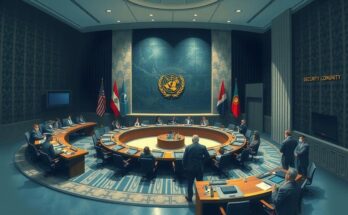PCCA criticizes IGAD for misrepresenting the effectiveness of the R-ARCSS in South Sudan, arguing that ongoing conflicts and political tensions are overlooked. They call for a national dialogue and a revision of strategies to achieve genuine peace, asserting the need for a constitutional agreement and elections rather than reliance on an outdated framework.
The People’s Coalition for Civil Action (PCCA) expresses its discontent regarding the Intergovernmental Authority on Development (IGAD) following the recent Summit concerning South Sudan. The Coalition finds the statements made in the IGAD Executive Secretary’s report and subsequent communiqué misleading, asserting that the claimed affirmation of the Revitalized Agreement on the Resolution of the Conflict in South Sudan (R-ARCSS) as the peace process’s cornerstone is fundamentally flawed and detrimental to genuine peace efforts.
PCCA argues that claims of the R-ARCSS facilitating peace are contradicted by the ongoing failures documented in reports from the Revitalized Joint Monitoring and Evaluation Commission (RJMEC). There are evident violations by President Kiir, including dismissals of officials without consent from other parties. Persistent military defections and lack of a unified command demonstrate the absence of stability and peace in South Sudan, with refugees and displaced persons unable to return home.
The Coalition highlights that many South Sudanese citizens perceive the R-ARCSS as a trap that endangers their lives. In questioning IGAD’s justifications for the agreement’s effectiveness, PCCA points to recent violence in the country as indicative of rising discontent and frustration regarding the accord’s implementation and its failure to foster sustainable development or political transition.
The PCCA further critiques IGAD’s decision to form a sub-committee aimed at restoring calm and overseeing the R-ARCSS’s implementation. They find this approach vague and inadequate, as it lacks clear strategies to address the root causes of instability. The Coalition insists that mere calm restoration will not suffice without a comprehensive plan addressing the underlying issues.
PCCA clarifies that their critique is intended to prompt regional leaders to recognize the true dynamics in South Sudan, which stem from political succession tensions rather than the R-ARCSS itself. They urge that speculations around President Kiir’s potential power transition should be addressed directly rather than be misrepresented within the confines of the peace agreement framework.
The Coalition concludes that both the R-ARCSS and the Tumaini Initiative have become obsolete and are insufficient for addressing current political challenges in South Sudan. They call for a national political roundtable that includes a broad spectrum of political leaders, aiming for a constitutional agreement and clear timelines for elections. Without such constructive measures, South Sudan risks descent into chaos, endangering both its future and regional stability.
The PCCA firmly criticizes IGAD’s handling of the peace process in South Sudan, arguing that the assertions made about the R-ARCSS’s effectiveness are unfounded and damaging. The Coalition calls for a re-evaluation of strategies to promote peace and urges direct engagement with the country’s political realities, advocating for a comprehensive national dialogue to avert further turmoil and ensure regional stability.
Original Source: www.radiotamazuj.org




